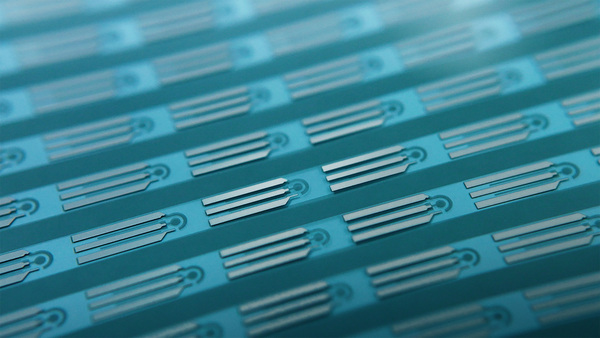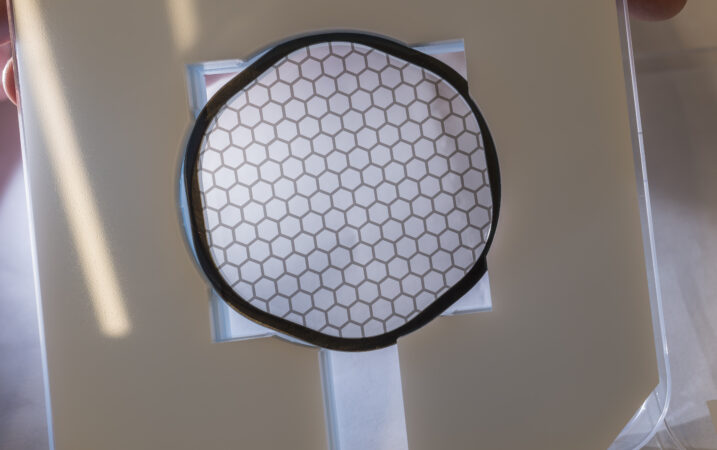
Electrochemical sensors
Electrochemical sensors using Canatu carbon nanotubes offer a versatile, proven, and scalable material platform with industry-leading sensitivity.
Electrochemical sensors create new opportunities in diverse industries
Canatu offers a versatile platform technology for electrochemical sensors across industries. Electrochemical sensors using Canatu CNT offers over 10x higher sensitivity compared to our competitors. This superior sensitivity is achieved through our patented dry deposition technology, which allows us to create carbon nanotubes with uniquely pristine and expansive reaction surfaces. Exceptional sensitivity unlocks unprecedented detection capabilities for new applications in new diverse industries. Electrochemical sensors using Canatu CNT promise highly sensitive, quantitative, accurate, reliable, and cost-effective analyses for medical diagnostics, veterinary care, environmental monitoring, industrial applications, food & beverages, and more.
Key benefits
- Sensitive: strong signal and low detection limit thanks to large and pristine reactive surface of the CNTs
- Versatile: ability to quantitatively detect various substances from ultra-low concentrations of fluidic samples
- At scale: experience and expertise to produce tens of millions of sensors every every year
Electrochemical sensors outclass established and emerging methods
Electrochemical sensors using Canatu CNT surpass both established and emerging solutions with superior quantitative detection, rapid results, low cost, ease of use, and high sensitivity. This transformative technology has the potential to redefine quantitative analyses in various industries.
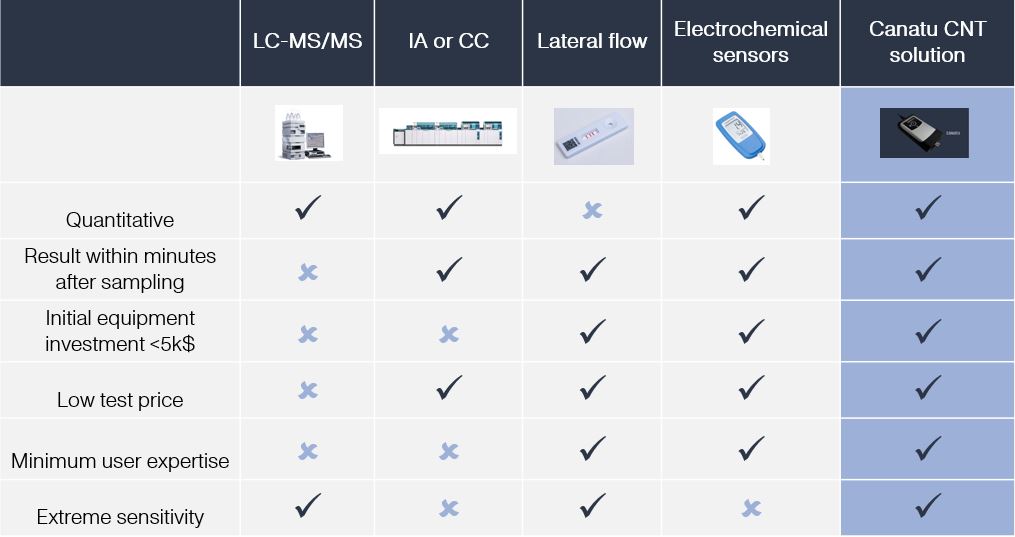
Download technical data
We are looking to partner with frontrunners ready to transform industries. Download technical data to explore our capabilities further.
Download technical data
Electrochemical sensors offer unprecedented opportunities
Electrochemical sensors based on Canatu CNTs offer new opportunities for diverse applications in various industries. With their exceptional sensitivity, these advanced electrochemical sensors can detect a wide range of substances at ultra-low concentrations. This makes electrochemical sensors invaluable for real-time monitoring of critical parameters in fields such as medical diagnostics, veterinary care, environmental monitoring, food & beverages, and industrial processes.
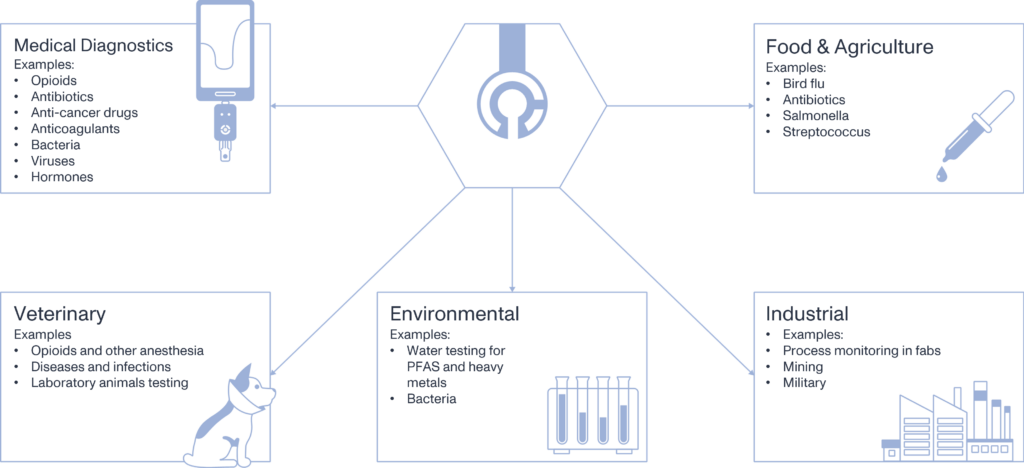
Canatu is currently validating the feasibility of Canatu CNT-based electrochemical sensors for various use cases. These include, but are not limited to, applications such as electrochemical biosensors for therapeutic drug monitoring (Paracetamol, Tacrolimus), hormones (Testosterone, Dopamine, Serotonin), Drugs of Abuse (Fentanyl, Oxycodone, Morphine), antibiotics (Vancomycin), and bacteria / virus detection (E.Coli). Other promising applications for electrochemical sensors beyond medical diagnostics include veterinary care, such as detecting Mastitis udder infusion in cows, and environmental water quality monitoring, among others.
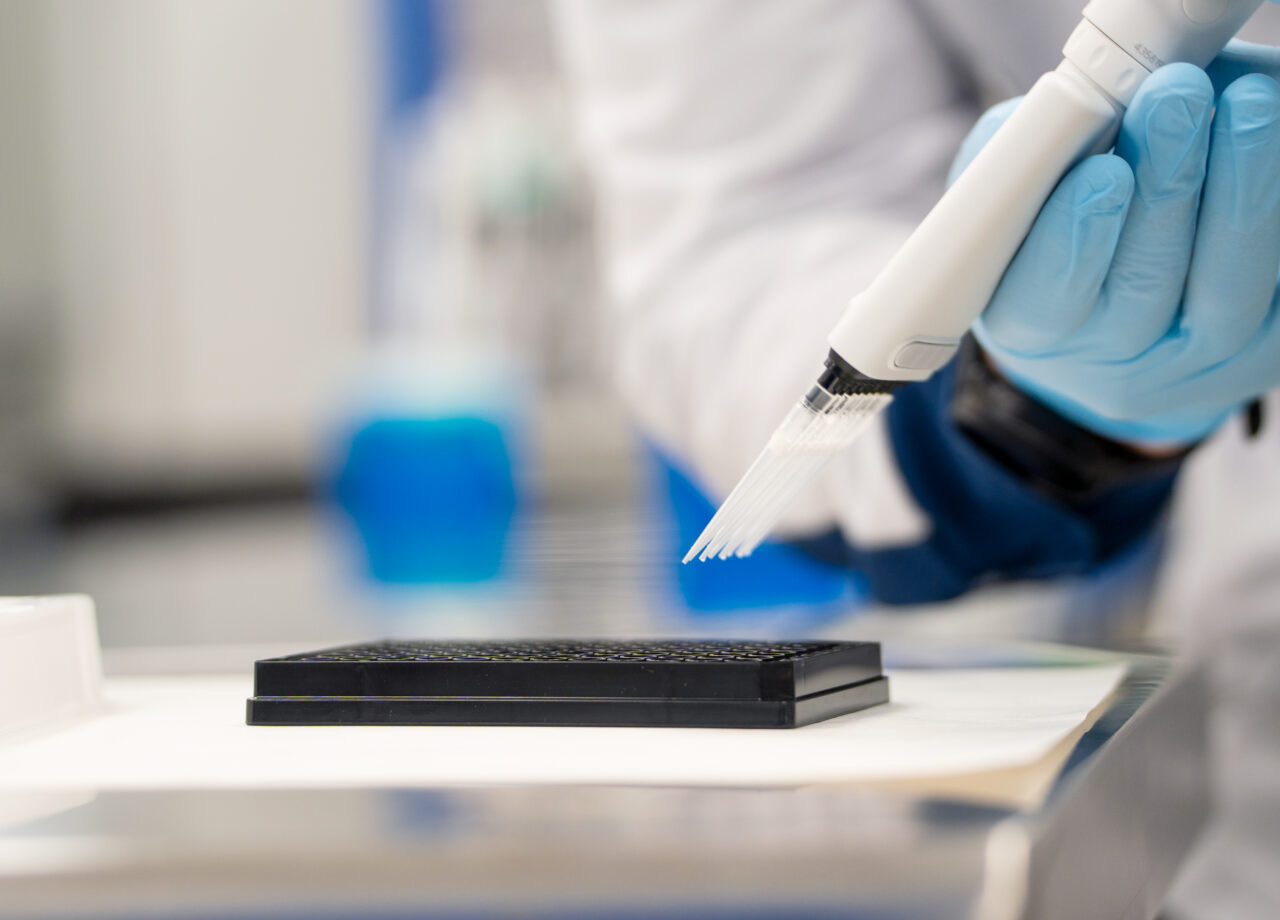
Electrochemical biosensors
Electrochemical biosensors bring the lab-level analysis anywhere. Point-of-care electrochemical detection is on the rise, enabling rapid on-site detection of various biomarkers. These electrochemical biosensors hold great promise in transforming medical diagnostics, offering accurate and timely results, while making low-cost, easy-to-use, and accessible diagnostics possible.
See electrochemical biosensor video
Electrochemical sensors based on Canatu CNT
Electrochemical sensors using Canatu CNT offers over 10-fold increased sensitivity compared to other materials, enabling rapid, selective, and quantitative chemical measurement of different substances. This exceptional sensitivity is achieved through our patented dry deposition™ technology, which yields CNTs with uniquely pristine and extensive surface areas. In electrochemical sensors, this large surface area provides many binding sites, enhancing the capability to detect specific chemical analytes. Additionally, the unique structure of carbon nanomaterials offers distinct advantages. Unlike other materials used in electrochemical sensors, such as gold and platinum, carbon nanotubes’ three-dimensional carbon structure allows for a sturdy and reliable attachment of biorecognition elements, enabling effective functionalization across a broad range of applications.
The superior sensitivity is achieved through our patented dry deposition™ technology that allows us to produce CNTs with uniquely pristine and extensive surfaces.
Furthermore, the unique structure of CNTs offers distinct advantages for electrochemical sensors. In medical diagnostics, their three-dimensional carbon structure allows for sturdy and reliable attachment of biorecognition elements, enabling effective functionalization across a diverse range of applications.
The exceptional sensitivity unlocks unprecedented electrochemical detection capabilities for new assays. Our proprietary click chemistry provides a versatile platform technology for detecting any analyte of interest, including DNA mutations, pathogens, hormones, and drug molecules. This presents unique opportunity to detect severe diseases and infections in their earliest stages.
Click chemistry uses biorecognition elements, such as DNAs, antibodies, aptamers and enzymes to modify electrodes for specific target analytes. These elements interact with the target analyte, generating electrical signals that are then processed by an electronic system.
Canatu has the expertise and experience to produce tens of millions of sensors every year.
Canatu has the experience and expertise to produce tens of millions of sensors every year. Our patented dry deposition™ method and electrode patterning process are fully compatible with roll-to-roll production and have been successfully demonstrated on an industrial scale. We have been mass producing our sensors for multiple industries since 2015.
We also excel in customizing our CNTs to meet specific application requirements. With extensive in-house CNT post-processing capabilities, we can customize surface functionalization to immobilize biorecognition elements, enabling selectivity for specific target analytes. We can also adjust both individual CNTs and the overall CNT network morphology to suit specific requirements. For example, we can tune bundle size during CNT synthesis to optimize click chemistry, and purify CNTs to remove residual iron from the synthesis process to enhance sensitivity.
Contact Ilkka on electrochemical sensors

Send us a message
We are looking for a partner for product development and commercialization. If you’re interested in exploring this opportunity further, contact our CTO Ilkka Varjos.
Related content
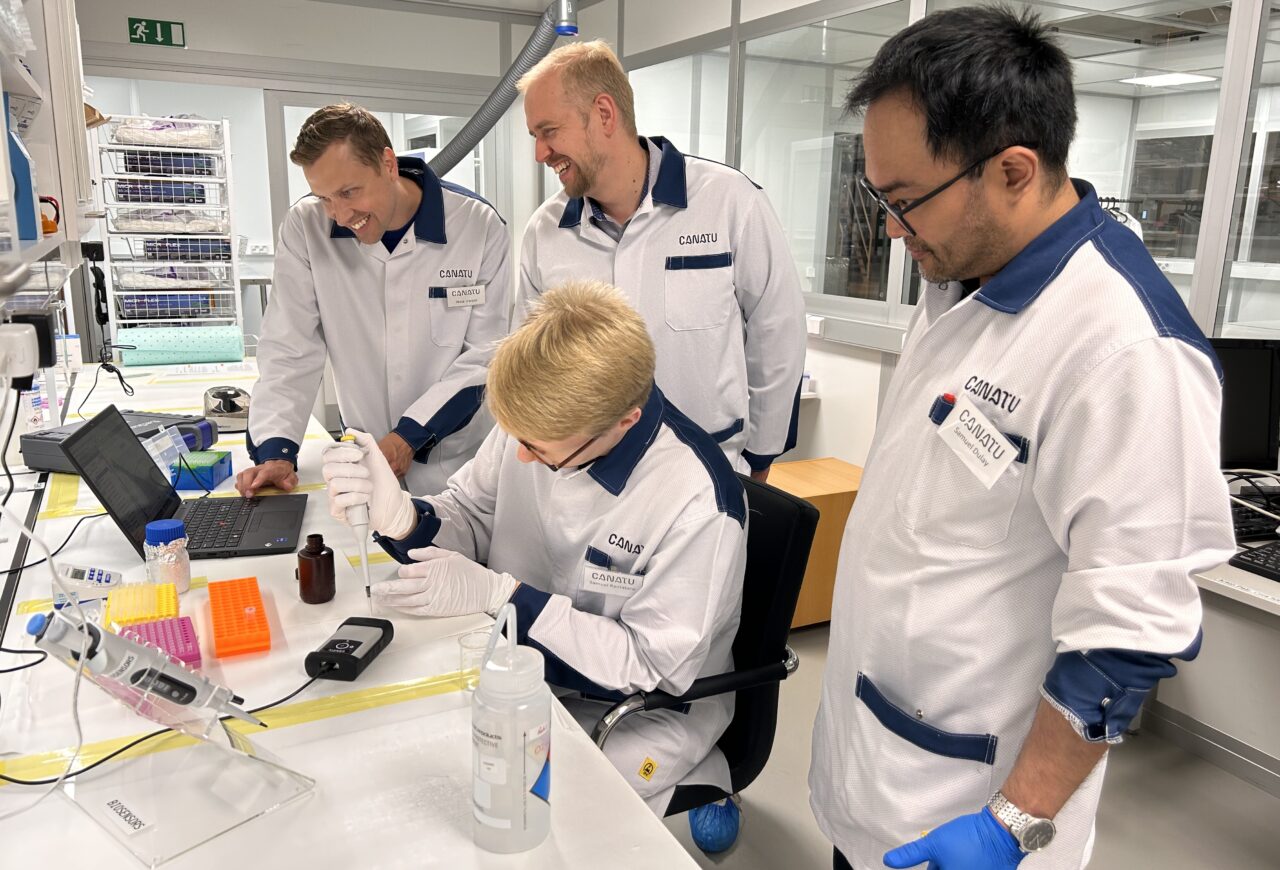
While our experts solve the issues of today, they are also working on what’s to come. Currently, our technology for electrochemical sensors is developing fast. Because of the exceptional purity of Canatu CNTs, remarkable analytical performance can be attained in various sectors such as clinical analysis, environmental monitoring, agriculture and neuroscience. Learn more.

Simple and inexpensive lab-level tests will give caregivers better means to determine the best patient care at the point-of-care. Learn our role in advancing medical diagnostics.
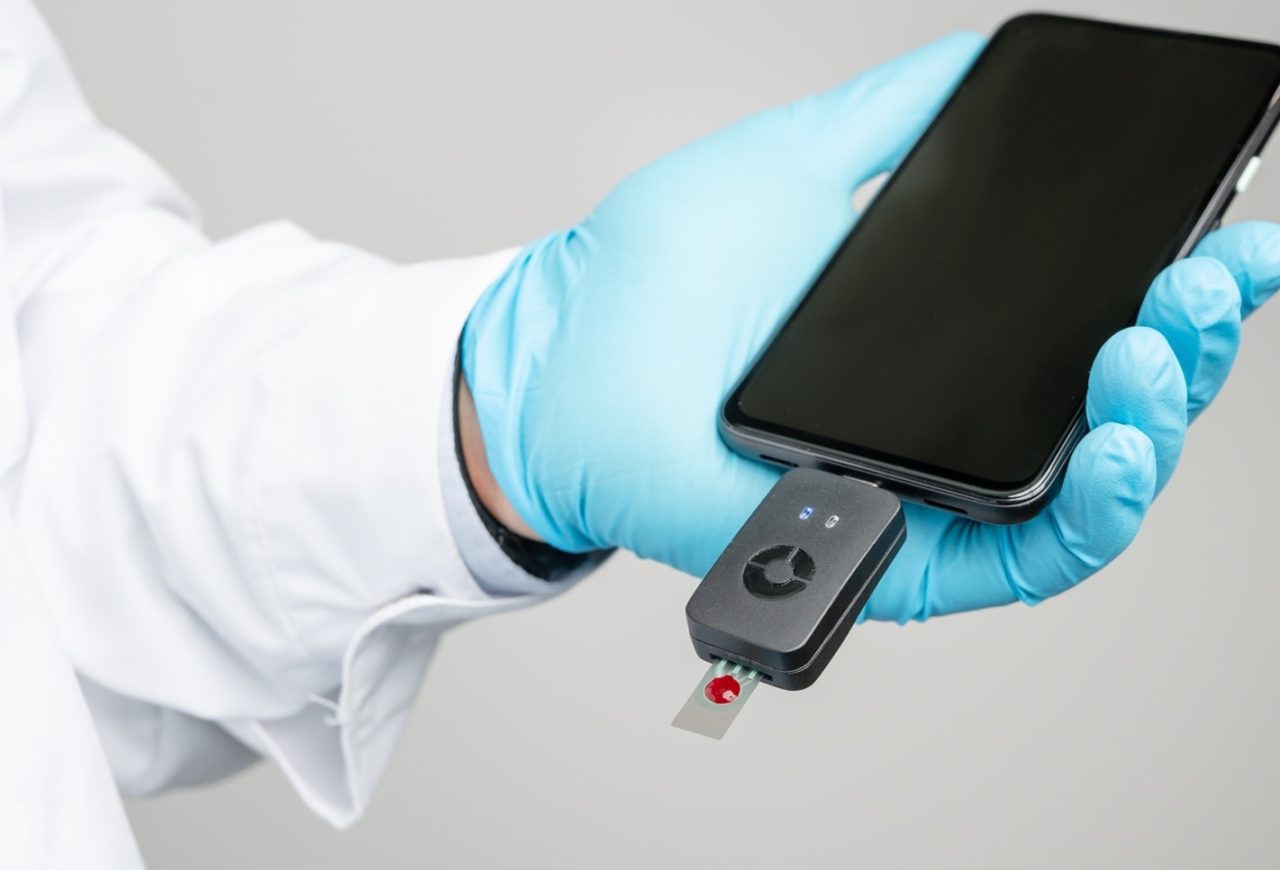
The inherently large surface area, high conductivity and tailorable surface chemistry makes Canatu CNTs an ideal electrode material for electrochemical biosensors. See the product.
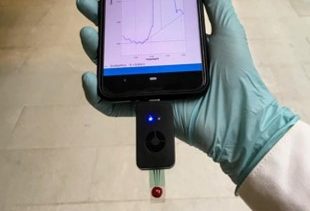
Electrochemical sensors for bedside blood concentration measurement progress to clinical studies. The new point-of-use measurement enables real-time detection of analgesics from blood without extensive sample treatment, improving test result wait time, cost and convenience. See press release.

Finnish ecosystem spurs diagnostics development. Canatu will develop a new hybrid electrochemical sensor for target detection and drug concentration measurement. See press release.

Canatu partners with forerunner companies, research partners and a leading Finnish University Hospital, together transforming products for better tomorrows with nano carbon. See how we collaborate for an impact.

